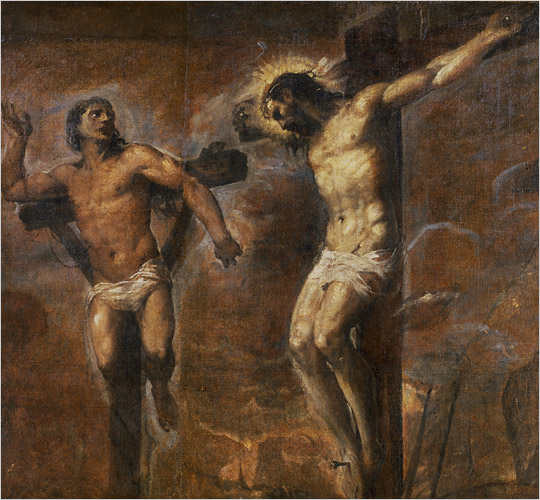Luke 23
“Father, forgive them, for they know not what they do.”
Luke 23
26 And as they led Him away, taking hold on one Simon, a Cyrenian, coming out of the country1, they laid the cross on him to bring it after Jesus.
27 And there followed Him a multitude of many people and of women, who also bewailed and lamented Him.
28 But Jesus turning to them said, Daughters of Jerusalem, do not weep for Me, but weep for yourselves and for your children.
29 For behold, the days are coming in which they shall say, Happy are the barren, and the wombs which never gave birth, and the breast which never nursed.
30 Then they shall begin to say to the mountains, Fall on us; and to the hills, Cover us.2
31 For if they do these things in the moist tree, what shall be done in the withered?
32 And there were also others, two malefactors, led with Him to be slain.
33 And when they had come to a place called Skull, there they crucified Him and the malefactors, one on the right hand and the other on the left.
34 And Jesus said, Father, forgive them, for they know not what they do. And dividing His garments, they cast lots.
AC 9325:8. By “the barren” are meant the Gentiles who are summoned to the church, and to whom the church is transferred when the old church ceases, that is, when those who before had been of the church are no longer in faith, because they are in no charity.
AE 710:8. “The barren,” and “the bellies that have not borne,” signify those who have not received genuine truths, that is, truths from the good of love [to the Lord]. And “the breasts that have not given suck” signify those who have not received genuine truths from the good of charity [toward the neighbor]. For all truths are from good; and goods are of two kinds, celestial good, which is the good of love to the Lord, and spiritual good, which is the good of charity towards the neighbor. “Breasts” have a similar signification as “milk,” namely, truth from good.
AC 4299:2. Conscience is a new will and a new understanding from the Lord. Thus it is the Lord’s presence in a man, and this the nearer, in proportion as the man is in the affection of good or of truth. If the Lord’s presence is nearer than in proportion as the man is in the affection of good or of truth, the man comes into temptation. The reason is that the evils and falsities which are in the man, moderated by the goods and truths that are in him, cannot endure a nearer presence. This may be seen from the things that take place in the other life: that evil spirits cannot possibly approach any heavenly society without beginning to feel anguish and torment; also that evil spirits cannot endure to have angels look upon them, for they are instantly tortured and fall into a swoon; and also from the fact that hell is remote from heaven, for the reason that it cannot endure heaven, that is, the Lord’s presence which is in heaven. This is the reason why it is said of such in the Word:
Then shall they begin to say to the mountains, Fall upon us; and to the hills, Hide us (Luke 23:30).
TCR 539:2. … As the Lord is mercy itself, He forgives all men their sins, nor does He impute a single sin to anyone, for He says, “They know not what they do.” Nevertheless, sins are not thereby taken away. For to Peter asking how often he should forgive his brother’s trespasses, whether he should do so seven times, the Lord said:
I say not unto thee, until seven times, but until seventy times seven (Matt. 18:21-22).
What, then, will not the Lord do?
1 Literally, “field”
2 Hosea 10:8
Questions and Comments
- In verses 28 and 29, the Lord says, “Happy are the barren….” The barren are the gentiles who did not know about the Word and so were ready to receive it, instead of resisting it like the people of the old church. Do you sometimes wish you were a gentile? How can we help our children come to the New Church with fresh eyes and hearts?
- Do we sometimes wish to hide from the face of the Lord and His angels?
- Since the Lord does not impute a single sin to anyone, why are sins not simply taken away?
| previous |  |
next |
|---|


